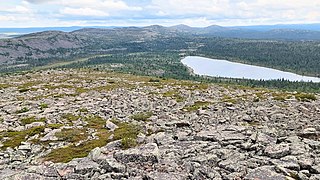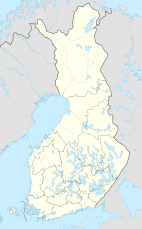Strict nature reserves are specific areas in Finland which have been established for scientific reasons. Their primary purpose is the conservation of nature and research. The regulations for the nature reserves are much stricter than those for the national parks of Finland. It is usually not permitted to travel inside the areas, although some areas have trails open for the public. The strict nature reserves cover a total area of 1,530 km2.

The European Diploma of Protected Areas, established in 1965, is a diploma awarded by the Council of Europe to protected areas of exceptional European conservational interest. It is awarded for a five-year period at a time and is renewable. Over 60 areas in 23 states have received the award so far.

Kevo Strict Nature Reserve is a strict nature reserve located in Utsjoki, northern Lapland, Finland. It was established in 1956 and covers 712 square kilometres (275 sq mi).

Malla Strict Nature Reserve is a strict nature reserve located in Lapland, Finland. The area has been protected since 1916 and was declared a strict nature reserve in 1938. Reindeer grazing has been prohibited since 1981. It encompasses 30 square kilometres (12 sq mi) and is managed by Metla. There is a trail in the park, access to this has to be separately organized. Most of the species found here can also be found on various places around Saana fell, which is accessible.
Pelso Strict Nature Reserve is a strict nature reserve located in Northern Ostrobothnia, Finland. The swampy reserve is noted for its bird fauna.

Värriö Strict Nature Reserve of Lapland, Finland, was established in 1981. Moving within the natural park happens under license. In the area there is a research station and the only way to go there is by trail. Field studies are carried out to investigate reindeer herding and predators, such as wolves and wolverines. This Strict Nature Reserve is 12,500 hectares in size.
Paljakka Strict Nature Reserve is a strict nature reserve located in the Kainuu region of Finland. It consists of old, high spruce forest, where the highest trees can reach 40 metres (130 ft). Finland's only orchid species, Cypripedium calceolus, grows in the Paljakka reserve.
Häädetkeidas Strict Nature Reserve is located in the Pirkanmaa and Satakunta regions of Finland. This thick, ancient forest and swamp reserve is inaccessible to the public. Bears and beavers make up some of the animal populations here and nearby regions.
Sinivuori Strict Nature Reserve is a strict nature reserve located in the Pirkanmaa region of Finland. There are no paths in this reserve of deciduous forest, though walking on the crossing roads is allowed. Most of the forests of this type in Finland have been logged down, when fields were created.
Maltio Strict Nature Reserve is a strict nature reserve located in Lapland, Finland. It has been used f.e. to study the relation of reindeers and predators. At Maltio is lot of bird species.
Pisavaara Strict Nature Reserve is a strict nature reserve located in Rovaniemi and Tervola municipalities in Lapland, Finland. This varied reserve includes the southernmost arctic biotope in Finland, as well as totally unmanaged forests of both southern and northern Finnish types. There is no public access.
Koivusuo Strict Nature Reserve is a strict nature reserve located in the North Karelia region of Finland.
Salamanperä Strict Nature Reserve is home to Wolverine and Finnish Forest Reindeer, and it is said that wolves can be heard while in the nature reserve. It has a trail, but the distance of the trail is unknown as of now. This nature reserve is connected to Salamajärvi National Park and is a strict nature reserve. It is located in the Central Finland region of Finland.

Sompio Strict Nature Reserve is a strict nature reserve located in Lapland, Finland. The primary objective is to preserve forest, fjeld and mire nature. The core of the strict nature reserve is formed by the Nattastunturit Fjelds. Roaming in the reserve is allowed only along marked trails.
Sukerijärvi Strict Nature Reserve is a strict nature reserve located in Northern Ostrobothnia, Finland. This reserve resembles parts of Oulanka National Park, which has popular backpacking trails. There is no public access.
Karkali Strict Nature Reserve is a strict nature reserve located in the Uusimaa region of Finland. This small reserve protects a lush deciduous forest more commonly found in central Europe.
Vaskijärvi Strict Nature Reserve is located in southwestern Finland.
Vesijako Strict Nature Reserve is located in the Päijänne Tavastia region of Finland. This small reserve, near Lake Vesijako with two outlets in different watersheds, is noted for its geological features.

Sikhote-Alin Nature Reserve is a Russian 'zapovednik' in Primorsky Krai. It is a reserve for the endangered Siberian tiger.

Kostomuksha Nature Reserve is a Russian 'zapovednik' of forests, lakes, rivers and wetlands on the border of Russian and Finland. It was created in 1983, along with other protected areas, in part to mitigate the impact of the Karelskiy Okatysh mine outside of the town of Kostomuksha, one of the largest iron ore reserves in Russia, and also to protect the forest from increase commercial logging in the area. A further scientific purpose is the protection of forest reindeer and a type of landlocked salmon. The reserve is part of a transboundary reserve complex with reserves in Finland to the west, and is situated in the Kalevalsky District and Muyezersky District of the Republic of Karelia, about 500 km north of St. Petersburg and 500 km west of Arkhangelsk. The reserve was created in 1993, and covers an area of 47,569 ha (183.66 sq mi).







